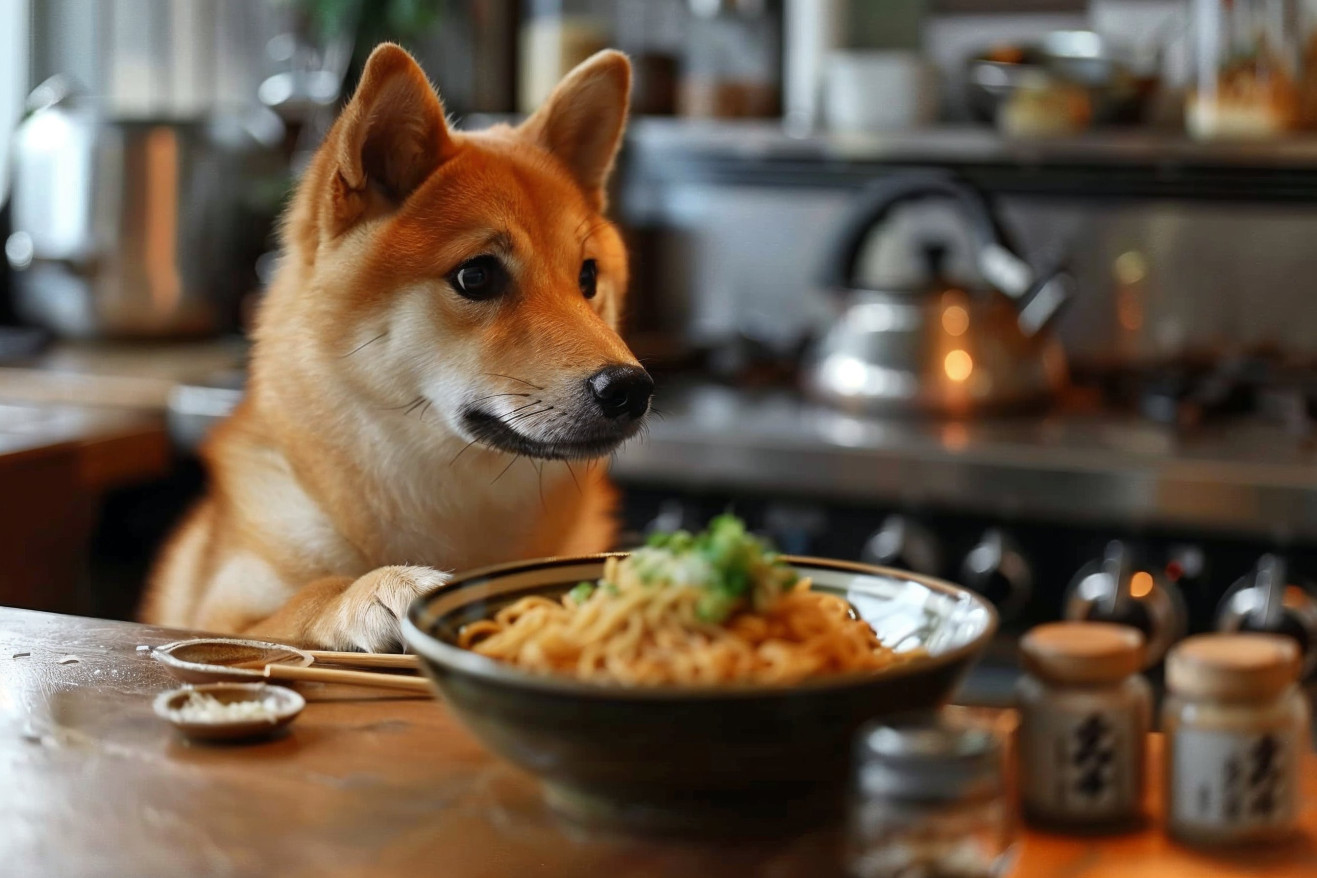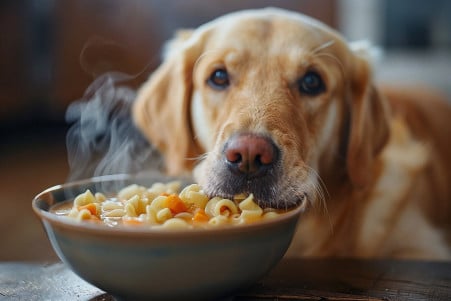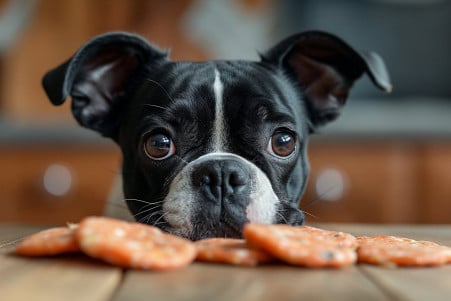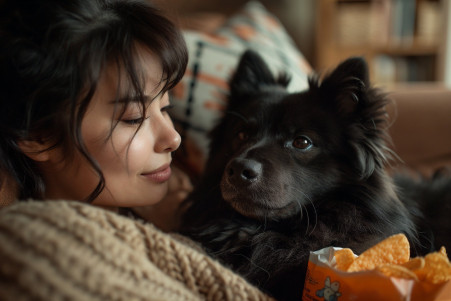Can Dogs Eat Ramen Noodles? Unpacking the Risks
15 March 2024 • Updated 14 March 2024

If you’ve ever found yourself enjoying a bowl of ramen and then looked down at your dog, you may have asked yourself, “Can dogs eat ramen noodles?” Dogs cannot eat ramen noodles because of their high sodium content, potential allergens, and the seasonings that are often used to flavor them, like garlic and onion.
These ingredients can lead to dehydration, neurological problems, and gastrointestinal upset in dogs, so ramen is not a good choice for their diet.
This article will use information from veterinary and nutritional research to explain why ramen noodles are bad for dogs. We will cover the nutritional needs of dogs, common food additives that are toxic to dogs, and some healthier food options for your pet. By the end of this article, you will understand how to feed your dog a diet that is both safe and nutritious.
Can dogs eat ramen noodles?
Knowing What Dogs Need in Their Diet
A dog’s diet is critical to its overall health, and it needs to include proteins for tissue repair and energy, fats for energy and cell function, carbohydrates for glucose, and a variety of vitamins and minerals for general health.
A dog’s diet needs to be complete and balanced, meaning it meets the standards set by the Association of American Feed Control Officials (AAFCO) for the right proportions of all of these nutrients, according to PetMD.
The idea of “complete and balanced nutrition” is even called out on dog food labels to show that the food meets the AAFCO’s minimum nutritional requirements, according to WebMD.
Human foods, especially those high in salt and refined carbohydrates like ramen noodles, can throw this balance off and lead to health problems. While dogs are omnivores, the source and quality of their food is still important, according to VCA Animal Hospitals. Unfortunately, ramen noodles don’t meet these standards, as they don’t provide the balance of nutrients that dogs need.
The American College of Veterinary Nutrition offers information for those who want to learn more about what dogs need in their diet, and a board-certified veterinary nutritionist can help people make sure their dog’s diet meets their specific needs.
The Dangers of Too Much Sodium for Dogs
Sodium is an important part of a dog’s diet, as it helps regulate cellular activity and maintain fluid balance. However, too much sodium can be bad for dogs. High-sodium foods like ramen noodles can lead to hypertension and make heart problems worse, especially in older dogs or dogs with kidney issues, and it can happen without the dog owner even realizing it.
Hill’s Pet explains that while it’s important to make sure that dogs don’t eat too much sodium, it’s also important to make sure that they get enough sodium to make their food taste good and be nutritious.
If a dog eats too much salt, they may experience symptoms like increased thirst, increased urination, vomiting, diarrhea, and in severe cases, seizures, which are a sign of salt poisoning. If a dog is showing these symptoms, it’s important to take them to the vet right away.
On the other hand, commercial dog food, including Hill’s Science Diet, is formulated to include the right amount of sodium to keep dogs healthy and safe, so dog owners can feel confident that they’re meeting their pet’s nutritional needs while protecting them from the dangers of salt.
It’s important to know how much sodium is in the food that you’re feeding your dog. While it can be tempting to give your dog table scraps like ramen noodles, knowing the dangers of too much sodium can help you make the best choices for your dog’s health in the long run.
Other Risks of Ramen Noodles for Dogs
In addition to the high salt content, many of the ingredients in ramen noodles are toxic to dogs. Battersea Dogs & Cats Home recommends avoiding onions, garlic, and chives in a dog’s diet. These Allium family members, which are often included in ramen seasoning, can cause gastrointestinal upset and even lead to damage to red blood cells in dogs, although the symptoms may not show up for a few days.
Monosodium glutamate (MSG), which is often added to ramen noodles, can also be toxic to dogs. While not all dogs are sensitive to MSG, those that are may experience symptoms that are similar to those caused by other toxic ingredients, including headaches and an increased heart rate, which can be worrisome for dog parents.
If your dog eats ramen noodles that contain these ingredients, it’s important to watch them closely for signs of illness and to call your vet or the ASPCA Animal Poison Control Center for advice.
The best way to protect your pet is to keep human foods out of their reach and to be mindful of the ingredients in any food that your pet could potentially get into. By being aware of these risks and taking steps to prevent them, you can help ensure that your dog is healthy and doesn’t experience the negative effects of toxic foods.
Healthy Human Foods to Give Dogs
If you do decide to give your dog human food, it’s important to make sure you’re giving them healthy alternatives to ramen noodles. According to Medical News Today, some of the healthiest options include carrots and apples, which are full of vitamins, fiber, and good for your dog’s teeth.
Cooked meats, like chicken and pork without salt or seasoning, are great sources of protein. Other healthy options include white rice, certain dairy products like plain yogurt, unsalted peanut butter, and a variety of fruits and vegetables, including blueberries, cucumbers, and green beans.
A 2001 study listed the health benefits of these foods for dogs, but it also noted that they should be given in moderation and that any human food given to dogs should be in line with their nutritional needs.
It’s important to note that while these foods can add to your dog’s diet, they should never replace a complete and balanced meal made for dogs.
Always talk to your vet about your dog’s diet, and for more information about dog nutrition, check out resources like the Animal Poison Control Center. By choosing wisely, you can help your dog live a healthier, happier life while avoiding the dangers of improper feeding.
Final Thoughts: Protecting Your Dog’s Diet
This article has covered the many reasons why ramen noodles and other human foods are bad for dogs. From the high sodium levels and dangerous ingredients like garlic, onion, and MSG to the lack of nutritional value, there are many reasons why ramen noodles are not a good choice for dogs.
By focusing on the importance of understanding a dog’s nutritional needs, this article has highlighted the importance of a well-balanced diet—one that meets AAFCO standards and ensures that our pets are healthy and happy.
In conclusion, it’s important to remember that while it’s easy to want to share our favorite foods with our dogs, their health should always be our top priority. There are plenty of healthy alternatives that are safe for dogs, such as carrots, apples, and lean, well-cooked meats, that can provide the nutrients they need without the dangers that come with human snacks.
It’s up to us as pet parents to make sure that we are feeding our dogs a healthy diet and that we are prioritizing their nutritional needs over the convenience of human food. Not only will this help us avoid potential health problems, but it will also help ensure that our furry friends live long, happy lives.


